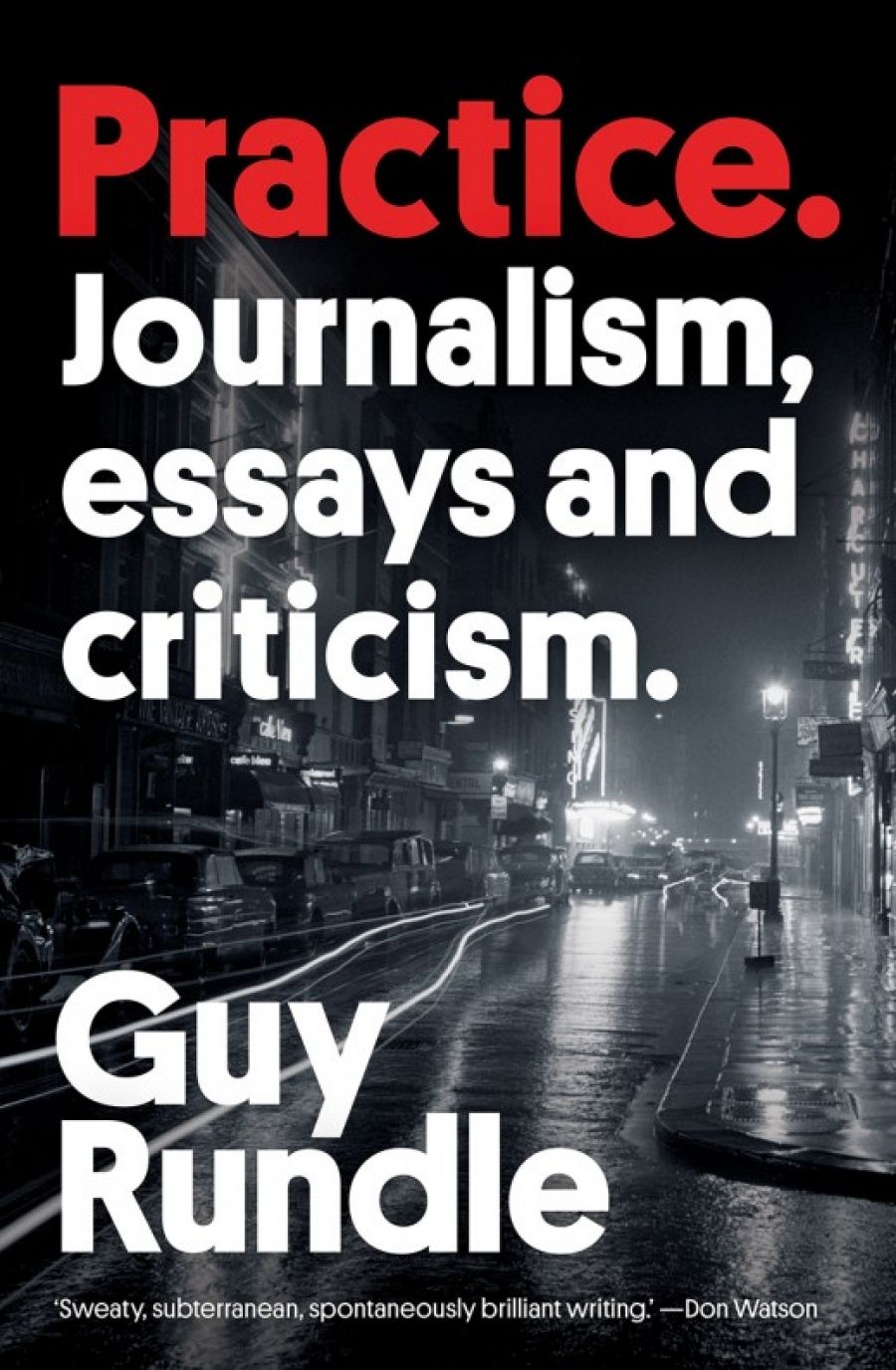
- Free Article: No
- Contents Category: Essay Collection
- Review Article: Yes
- Online Only: No
- Custom Highlight Text:
Not long into the Obama era, the American comedians Jon Stewart and Stephen Colbert hosted a high-profile ‘Rally to Restore Sanity and/or Fear’ in Washington, DC. In front of an enormous crowd of well-intentioned liberals, Stewart made a case for a return to the sensible centre. ‘We live in hard times, not end times,’ he declared ...
- Book 1 Title: Practice: Journalism, essays and criticism
- Book 1 Biblio: Black Inc., $32.99 pb, 373 pp, 9781760641313
It is a sobering thought, and one that Rundle comes at from a variety of angles. His Crikey journalism, which makes up about half of this collection, takes us right to the coalface; it is see-how-the-sausage-is-made political writing for the age of the PR consultant. Too often, he reflects, political events are described without appropriate context, ‘like reporting a fistfight without mentioning that it had taken place at a clown sex party in a Berlin S&M bar’. With Rundle, by contrast, we witness the hysterical shambles of modern politics firsthand through the eyes of a determined sceptic.
In his longer Arena and Meanjin essays, he goes up a gear or two, delivering polished, big-picture dissections of intellectual history and political philosophy (‘Into the Breach’, ‘The Bolshevik Century’). On such topics he is impressively well-read, with a rare ability to make references to Jean Baudrillard sound commonplace. In other pieces, he strikes a more personal note, writing himself into the history of London bohemia (‘Death in Soho’), or searching for the non-existent Kurt Cobain Trail in rural Oregon (‘Kurt Cobain in the Thriftway Carpark’).
Rundle is at his best, however, when he finds a balance between the wisecracking, on-the-ground immediacy of his journalism and the big-brained erudition of his longer efforts. He calls this a ‘journalism of nothingness’, an attempt ‘to go somewhere that is the furthest from a Starbucks, to a carpark between nowhere and nowhere’. In these exhilarating essays (‘Melbourne Interstitial’, ‘Deadmalling’), he slips into flâneur-mode, wandering the crumbling shopping centres and freeway underpasses of suburbia-in-decline, watching forlornly as these places go ‘from something to nothing’.
It is this stylistic and philosophical adroitness that makes Rundle such an intelligent guide to our modern malaise. He has, for example, a good claim to have seen Donald Trump coming – not literally, of course, but via his decade-long exploration of the sheer insanity of post-industrial, post-9/11, post-everything America. In 2010, for an essay on Sarah Palin (‘Palin in Celebration’), he travelled to Orlando to visit a gated community built – by the Disney Corporation, no less – to mimic a small 1950s American town, a place where ‘real people taking their kids out for a day looked like actors’. Rundle’s portrait of this strange pseudo-suburb – an entirely artificial version of an America that never was – says as much about Trumpism as any investigative journey to the Rust Belt.
Rundle’s America is a semiotically scrambled meta-world; a hollow, absurd, thoroughly mediated landscape crowded with images of a lost past. His writing is alive to the depressing fact that the circus carnival of late capitalism has almost fully destroyed the possibility of mass political organisation. In such an environment, a political mass like the one appealed to by Stewart simply cannot exist; it can only be fragmented into increasingly isolated communities and subcultures, a babel of incomprehensible political languages and toy towns. Make American Great Again? Yes We Can.
There is a melancholy that thrums beneath the surface of much of this writing. ‘Everything burns in the end,’ he writes in the book’s introduction. His – our – world is infused with a sense of belatedness, a dusk-in-autumn feeling that we’ve reached the end of something. Practice is certainly not an unenjoyable read – you are just as likely to laugh as to cry – but in between the gags there is always a hint of impending catastrophe.
This can sometimes make for grim reading, and Rundle attempts to offset his innate miserabilism with firm political commitment. Changes, he writes optimistically, are ‘impossible until they happen’. He insists that our new problems – Uber-style ‘disruption’, politics as spectacle, million-dollar homes built two hours from the nearest job – require new solutions. But if so, modern progressive parties will need to offer a more convincing account of ‘how society works’. These are hard times, and the sensible centre cannot hold.


Comments powered by CComment